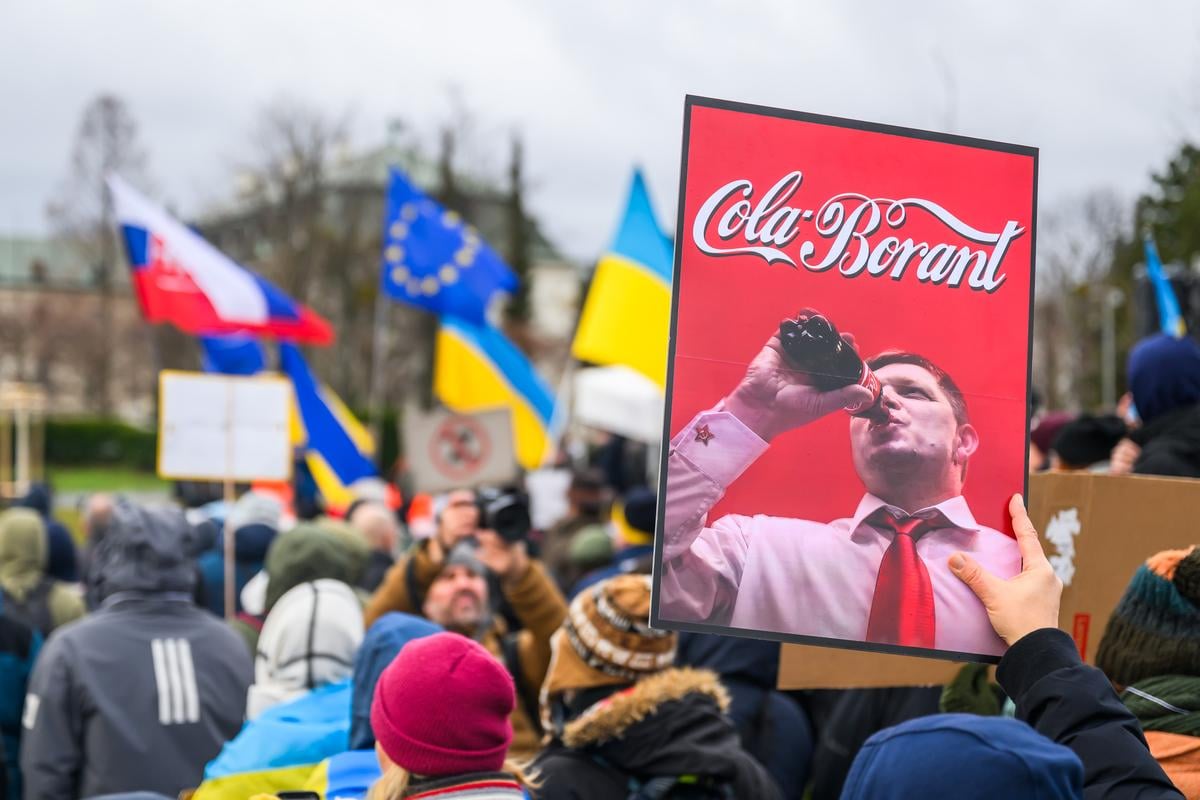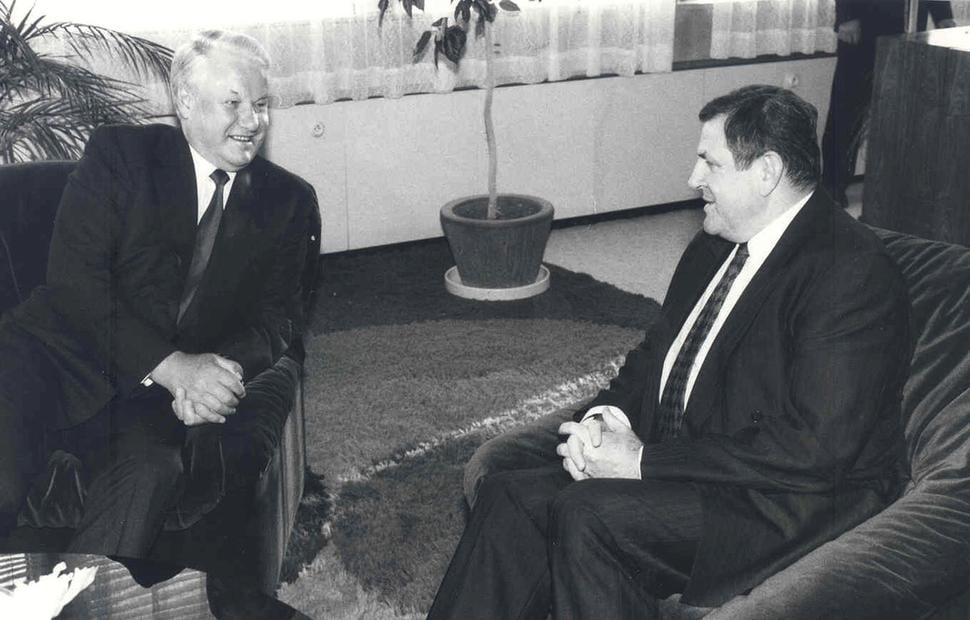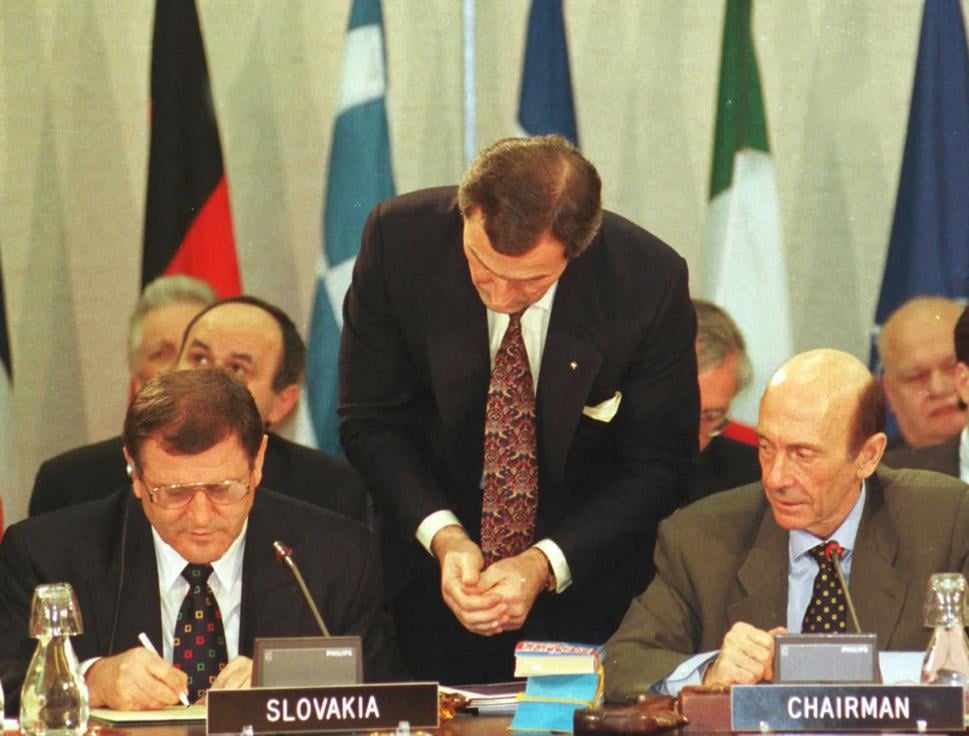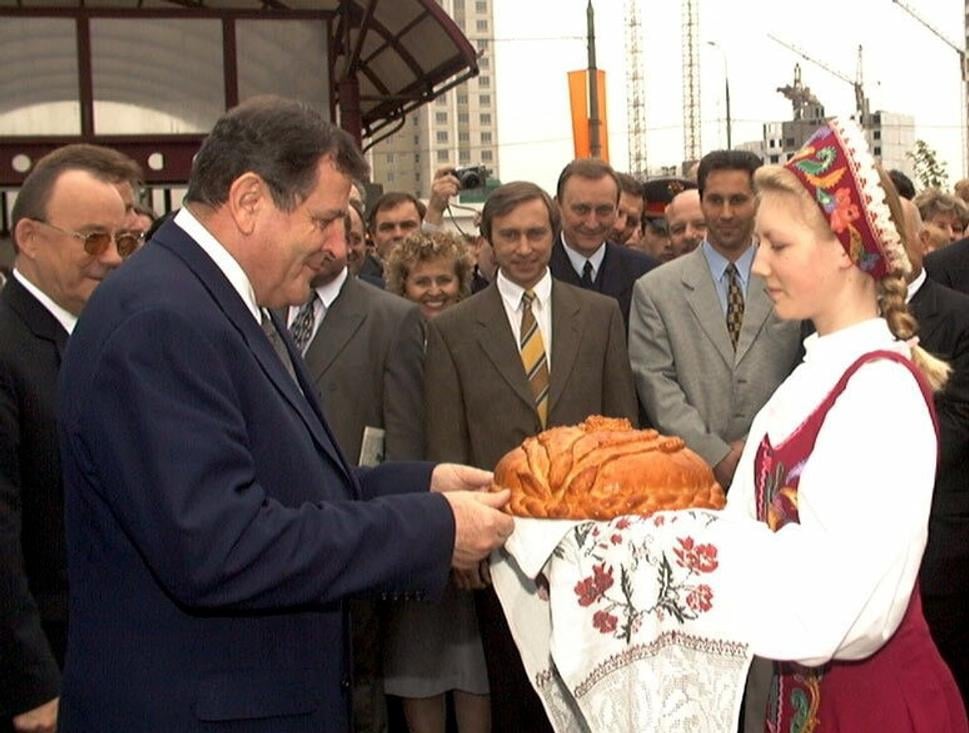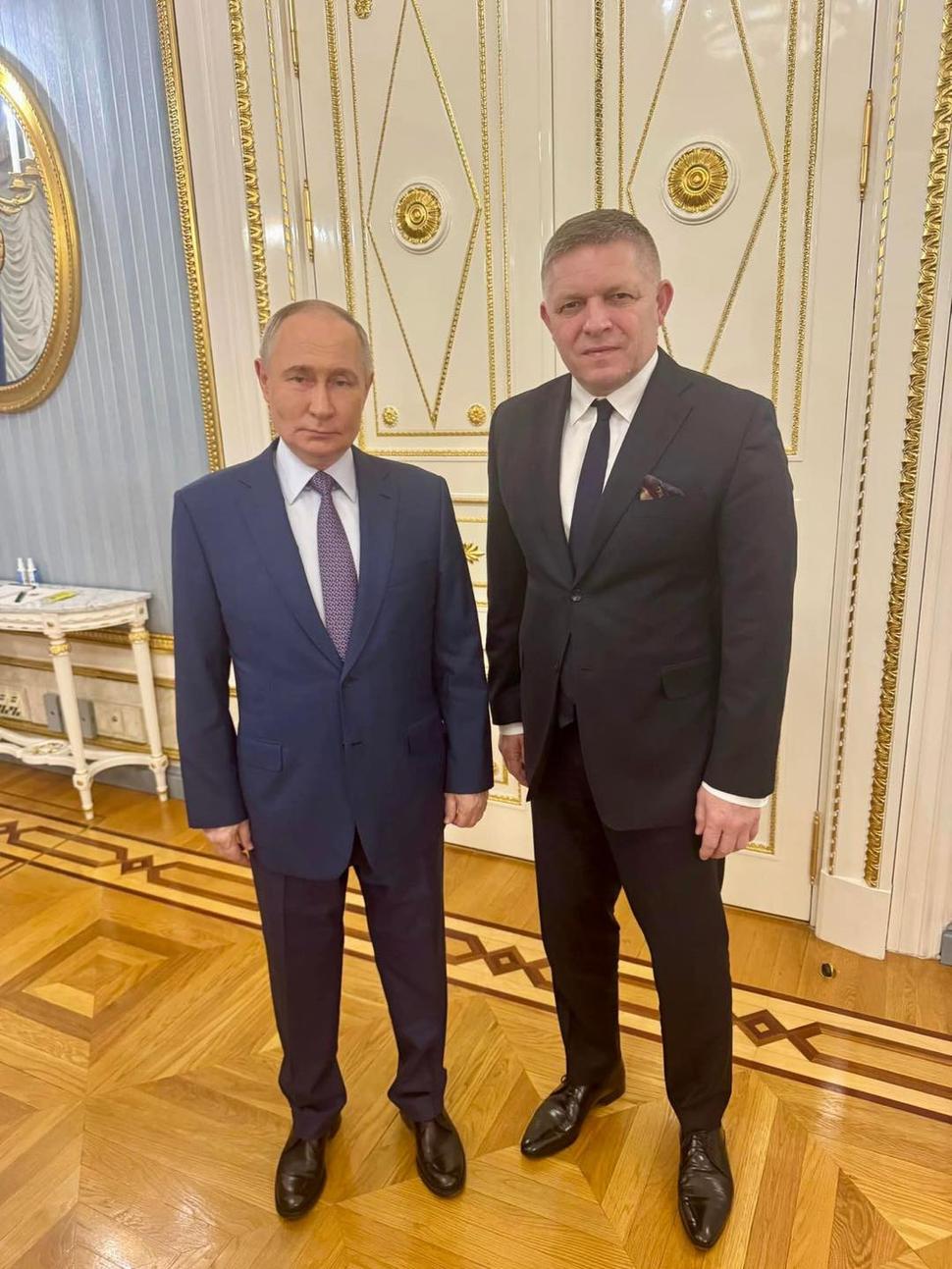When Russia’s then prime minister, Viktor Chernomyrdin, arrived in Slovakia for his second official visit in April 1997, he met with his Slovak counterpart, Vladimír Mečiar, to discuss European security, among other topics.
At the time, Slovakia was seeking to join NATO, something that Mečiar controversially claimed – in an interview with the French daily Le Figaro - was being blocked by a secret agreement between the United States and Russia. Both Washington and Moscow denied any such arrangement, though Russia remained opposed to NATO expansion. Chernomyrdin stated that Russia would prefer Slovakia to maintain a neutral stance.
“NATO today is a military alliance with a significant nuclear component, which has always been aimed eastward,” he said during his visit. However, he insisted, “I have never told anyone to join or not to join. I would never dare to do such a thing. Neither I nor anyone else from Russia.”
Similar to a previous meeting in 1995, where 12 agreements were signed, the 1997 visit resulted in the signing of 16 documents, including a long-term deal on the transit and supply of Russian natural gas. In an unusual diplomatic gesture, Chernomyrdin also offered Slovakia the opportunity to send its own astronaut into space. (This materialised in 1999, when a spacecraft carrying Slovakia’s first astronaut, Ivan Bella, launched from Russia’s Baikonur Cosmodrome in Kazakhstan as part of Russia’s debt repayment to Slovakia.) Two years earlier, Slovakia had secured Russian involvement in completing the Mochovce nuclear power plant.
Slovakia’s deepening ties with Russia have been evolving since 1993, when it split from the Czech Republic and Prime Minister Mečiar visited Moscow at Chernomyrdin’s invitation. That visit laid the groundwork for a Treaty of Friendship, signed in Bratislava in August 1993 by Slovak President Michal Kováč and Russian President Boris Yeltsin. The treaty, valid for 10 years, was accompanied by an agreement on military cooperation. By signing the treaty, Slovakia committed to aligning its security policy with the Organisation for Security and Co-operation in Europe (OSCE), which was intended to foster European security cooperation and prevent new divisions on the continent – including opposition to NATO expansion.
Russia’s resistance to NATO enlargement, though unwavering by 1997, had earlier fluctuated. During Chernomyrdin’s first visit to Bratislava in 1995, the topic of NATO was already under discussion. Mečiar, at the time, claimed that he did not sense any Russian attempt to obstruct Slovakia’s ambitions to join both the European Union and NATO.
“Russia considers these matters our internal affair,” he said.
Chernomyrdin, however, expressed surprise at the speed with which former Eastern Bloc nations were pursuing NATO membership. “There is no real source of danger or tension in Europe today that could lead to armed conflict between states,” he argued. “Nobody understands why the Visegrad Four [Poland, Hungary, the Czech Republic and Slovakia] is pushing for such rapid NATO accession. One day, we will all cooperate with NATO.”
In the end, Slovakia – branded “the black hole of Europe” by then US Secretary of State Madeleine Albright – was left out of NATO’s 1997 accession talks, unlike its Visegrad partners, which joined in 1999. The delay was largely attributed to political instability and concerns over democratic backsliding under Mečiar’s leadership from 1994 to 1998. However, Slovakia’s close ties with Russia – a strategy ostensibly aimed at bolstering its struggling economy – also contributed to its prolonged exclusion from the alliance.
A schizophrenic foreign policy
Initially, Mečiar framed Slovakia’s relationship with Russia in economic terms, positioning the country as a bridge between East and West. But as criticism mounted from Western capitals over democratic backsliding and authoritarian tendencies, Mečiar’s government increasingly aligned itself politically with Moscow.
“If the West doesn’t want us, we will turn to the East,” Mečiar said several months into his third government – though he later claimed he had no recollection of making the remark.
Vladimír Mečiar’s government frequently accused the US Embassy in Bratislava of unlawfully interfering in Slovakia’s internal affairs, lamenting what it said was a “double standard” by Western countries.
For Russia, opposing NATO expansion was a strategic priority. Slovakia’s ambiguous stance under Mečiar fit neatly into this agenda. Though his 1994-1998 government manifesto outlined ambitions to join NATO and the EU, mentioning Russia only in economic terms, his rhetoric on neutrality and alternative security arrangements backed by Moscow gave the Kremlin a foothold in Central Europe. Boris Yeltsin, Russia’s president at the time, left little doubt about his support, telling Mečiar ahead of the 1998 elections: “We very much want you to win the elections... In Moscow, we appreciate your efforts to orient yourself toward security and friendship with Russia.”
Mečiar’s HZDS party won the most seats in the 1998 election, but a coalition of his opponents was able to form a government.
Mečiar publicly reaffirmed Slovakia’s Western aspirations, meeting NATO officials in Brussels in 1995, but at home he entertained alternative scenarios. Members of his ruling coalition openly promoted Slovakia’s neutrality, with security guarantees from Moscow. Ján Slota, head of the far-right and Eurosceptic Slovak National Party (SNS), declared to Russian state media that Slovakia should avoid NATO membership altogether. The left-wing and pro-Russian Union of the Workers of Slovakia (ZRS), another coalition partner, suggested Russia could provide security guarantees instead. Mečiar refused to distance himself from these statements, merely saying that the government’s position had not changed “for now”.
Meanwhile, under their leadership, Slovakia’s democratic institutions eroded. Mečiar clashed repeatedly with President Michal Kováč, attempted to strip him of power, and stifled media freedom.
The NATO referendum fiasco
By 1997, Slovakia’s NATO bid was already in doubt, but a botched May referendum on membership sealed its fate. Instead of a straightforward vote, the Mečiar government added a controversial question: Should foreign troops and nuclear weapons be allowed on Slovak soil?
NATO had already stated in 1996 that it had no plans to deploy nuclear weapons or foreign bases in new member states. The addition of this question sowed confusion and raised suspicions that Mečiar was actively undermining Slovakia’s accession process. When the referendum collapsed in controversy, Russian media hailed this as a victory for Moscow. The Russian magazine Itogi described the Slovak prime minister as “the Kremlin’s Trojan horse in Central Europe”. Some critics, in fact, accused Mečiar of acting as a de facto Russian agent, deliberately stalling Slovakia’s Western integration.
However, after the failed referendum, Prime Minister Mečiar said that his HZDS party was the only political force fully committed to Slovakia’s integration into international economic and security structures. He made the statement despite the fact that the SNS and ZRS had actively campaigned for citizens to reject NATO membership during the referendum campaign.
Mečiar himself had urged consideration of Russia’s geopolitical interests. “Any rushed solution (expansion) is one-sided and will always provoke a negative reaction,” he often said during his third term in office.
Slovakia had to wait until 2004, six years after Mečiar lost power, to become a NATO member.
In December 1997, the European Union officially left Slovakia out of its first round of membership talks due to Mečiar’s increasingly authoritarian rule.
Economic dependence on Russia
Despite Mečiar’s talk of Slovakia as an “East-West bridge”, its economic reliance on Russia deepened. By 1996, Slovakia had signed dozens of bilateral agreements with Moscow, including on military cooperation, energy dependence and intelligence ties.
A case in point: in October 1996, Mečiar’s government agreed in Moscow to complete the Mochovce nuclear power plant with Russian assistance, committing Slovakia to buying Russian nuclear fuel for its entire lifespan. Experts questioned the move, noting that nuclear fuel could be sourced elsewhere – unlike Russian oil and gas, which had an almost unbeatable price advantage over other sources as it was piped in cheaply.
Trade remained heavily imbalanced, with Slovakia importing far more from Russia than it exported. In 1994, Slovakia imported $1 billion worth of Russian oil and gas but exported only $300 million in goods to Russia.
Mečiar’s political downfall in 1998 – which happened to coincide with leadership changes in Moscow, including Viktor Chernomyrdin’s departure as premier – marked a decisive shift. A few days after his election defeat, Mečiar went on TV to sing: “Farewell, I’m leaving you – I have wronged none of you.”
The new Slovak government, led by Mikuláš Dzurinda, quickly pivoted back toward the West, prioritising EU and NATO accession. Relations with Russia were downgraded to the level of economic pragmatism.
A return to the East?
Nearly three decades after Vladimír Mečiar maintained warm relations with Russia, Slovakia’s current prime minister, Robert Fico, now in his fourth term, appears to be taking a similar approach – albeit in a vastly changed geopolitical landscape. Unlike in Mečiar’s era, Slovakia has been a member of both NATO and the European Union since 2004.
When Fico first assumed office in 2006, he met Russian President Vladimir Putin at an informal EU summit in Finland. At the time, he reflected on Slovakia’s post-Cold War foreign policy, saying relations with Russia had not been particularly strong over the previous eight years.
“Not that there were any specific problems, but Slovakia’s foreign policy had been quite one-sidedly oriented towards the West,” Fico said.
He emphasised Slovakia’s economic ties with Russia, noting that the country was entirely dependent on Russian oil and gas. Slovakia has long faced – and continues to face – a trade deficit with Russia. Its dependence on Russian gas is slowly decreasing.
“Every EU member state has its own interests, but when it comes to Russia, we need to formulate common positions,” he said after his meeting with Putin.
At the time, Fico’s approach was framed as pragmatic economic diplomacy. However, the geopolitical landscape has since changed dramatically.
Fico’s position on Ukraine
Today, Russia is waging an unprovoked war against Ukraine, Slovakia’s eastern neighbour. Yet Fico and his government have refrained from calling Russia the aggressor. Instead, he has repeatedly accused the West of exploiting the war to weaken Russia economically and politically.
“There is a military conflict in Ukraine where Slavs are killing each other, and Europe is significantly supporting this killing,” Fico has repeatedly claimed, insisting that the war has no military solution. He also asserts that Ukraine will lose a third of its territory to Russia and remain occupied by foreign forces.
Fico’s relationship with Ukraine has been strained since a gas crisis in 2009, when a pricing dispute between Russia and Ukraine led to a 11-day halt in Russian gas supplies transiting Ukraine to Europe. Slovakia, one of the hardest-hit countries in the region, faced severe economic consequences. But rather than blaming Russia, Fico pointed the finger at Ukraine, accusing Kyiv of being responsible for the crisis.
Similarly, in 2008, following Russia’s invasion of Georgia during a conflict in South Ossetia, Fico refused to condemn Russia’s actions outright. “I wouldn’t see the situation in black and white, as some do,” he said. “Someone provoked, and we know who provoked. Then there was a reaction, and it was a very strong one.” His coalition partner at the time, the Slovak National Party (SNS), echoed Russian narratives, with SNS deputy chair Anna Belousová even accusing Georgia of attempted “genocide” in South Ossetia.
Fast forward to today, Fico has once again allied with the SNS, whose party leader Andrej Danko has emerged as one of the most vocal pro-Kremlin figures in the Slovak governing coalition.
Isolation vs influence
When Russia annexed Crimea in 2014, Slovakia, which was still heavily reliant on Russian energy, formally backed EU sanctions against Moscow. Fico acknowledged that Russia had violated international law, yet he remained critical of the sanctions, describing them as “harmful” to Slovakia. A year later, in 2015, he travelled to Moscow for celebrations to mark the end of the Second World War, an event boycotted by most other European leaders in protest at Russia’s annexation of Crimea.
Fico plans to visit Moscow again this year, on the 80th anniversary of the end of World War II.
“Please, let’s not suffer from Russophobia. Let’s not automatically assume that expressing something positive about the Red Army or the former Soviet Union makes us Putin’s agents,” Fico argues.
Fico’s stance on sanctions hardened after his return to power in late 2023. He has also adopted a more overtly anti-Ukrainian position, opposing Ukraine’s NATO membership on the grounds that it would “lead to a third world war”. During his 2023 election campaign, he vowed: “If our party wins, we will not send a single bullet to Ukraine.”
After taking office, Fico halted military aid from Slovakia’s armed forces – though he has not ended commercial contracts for weapons exports to Ukraine, which are a profitable source of income for Slovak arms manufacturers. Despite this, he maintains that he opposes the war. While acknowledging that Russia violated international law by invading Ukraine, he argues that “Russia had a reason to do so”.
Then, in December 2024, shortly before a Ukrainian decision not to renew an agreement that had allowed Russian gas to transit to Europe came into effect, Fico secretly flew to Russia to meet with Putin. The exact purpose of his visit remains unclear; Russian gas now no longer flows through Ukraine to Slovakia, and Fico, who met Putin alone, has not explained in detail what was discussed. What did result, however, was a photograph of Fico shaking hands with Putin. In the months since, Fico has repeatedly lashed out at Ukraine’s President Volodymyr Zelensky, calling him “a blackmailer” and declaring that he is “sick of him”. He has never used such language about Putin.
Despite Fico’s rhetoric, his government continues to provide humanitarian aid to Ukraine and supplies electricity and gas when necessary. This is not as surprising as it might sound. Slovakia has previously played a key role in mitigating the effects of Russian energy policies on Ukraine. In 2014, under Fico’s rule, after Russia cut gas supplies to Ukraine over unpaid debts, Slovakia enabled a solution: it redirected Russian gas that had already entered Slovakia back to Ukraine via an alternative pipeline route.
Still, Fico’s current foreign policy has sparked widespread protests, with demonstrators chanting “Slovakia is Europe”.
Much like Mečiar in the 1990s, Fico has embraced the notion of a “sovereign foreign policy”. He has railed against the US Embassy, criticised EU leaders, and accused Slovakia’s closest allies, including the Czech Republic, of meddling in its internal affairs. At the same time, he has sought to strengthen ties with pro-Russian Serbia and authoritarian China.
His current stance towards the EU stands in sharp contrast to his own words from 2013, when he championed deeper European integration. “Slovakia must be part of the group of countries that support further integration within the European Union,” he said at the time. “This is a positive loss of sovereignty, and we should be open to it.”
Today, while Fico acknowledges the EU’s importance to Slovakia, he criticises it for promoting what he calls a “one correct opinion” policy. He also rails against “liberal ideologies”, aiming to appeal to ultraconservative and far-right voters. In contrast, following Donald Trump’s return to the US presidency, Fico has toned down his criticism of the United States.
Whether Fico’s current policies represent a true ideological shift or a strategic political move remains an open question. But one thing is clear: Slovakia’s foreign policy under his leadership has once again become a subject of intense debate, both at home and abroad.
And what about Russia? At a meeting with ambassadors in January, Fico rejected what he called a new Iron Curtain between Europe and Russia.
“We are interested in good relations and will do everything we can to normalise ties between Slovakia and Russia once the war ends,” the prime minister said.


